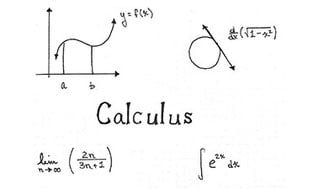
Want to take an AP Calculus class, but aren’t sure you are ready? Want to review some of your precalculus topics before your AP class begins? Want a preview of the big ideas of AP Calculus and math? If you answered “yes” to any of these questions, this math course is for you.
We’ll preview the concepts behind both derivatives and integrals as well as review many of the precalculus topics most relevant to AP Calculus such as: Trigonometric functions, Exponents & Logarithms, Sequences & Series, Limits.
Read more
Want to take an AP Calculus class, but aren’t sure you are ready? Want to review some of your precalculus topics before your AP class begins? Want a preview of the big ideas of AP Calculus and math? If you answered “yes” to any of these questions, this math course is for you.
We’ll preview the concepts behind both derivatives and integrals as well as review many of the precalculus topics most relevant to AP Calculus such as: Trigonometric functions, Exponents & Logarithms, Sequences & Series, Limits.
Want to take an AP Calculus class, but aren’t sure you are ready? Want to review some of your precalculus topics before your AP class begins? Want a preview of the big ideas of AP Calculus and math? If you answered “yes” to any of these questions, this math course is for you.
We’ll preview the concepts behind both derivatives and integrals as well as review many of the precalculus topics most relevant to AP Calculus such as: Trigonometric functions, Exponents & Logarithms, Sequences & Series, Limits.
*Advanced Placement® and AP® are trademarks registered and/or owned by the College Board, which was not involved in the production of, and does not endorse, these offerings.
What you'll learn
- How to find rates of change
- How to use areas to turn rates of change into totals
- Review precalculus topics such as: Trigonometric Functions, Exponents & Logarithms, Sequences & Series, Limits
What's inside
Learning objectives
- How to find rates of change
- How to use areas to turn rates of change into totals
- Review precalculus topics such as: trigonometric functions, exponents & logarithms, sequences & series, limits
- How to find rates of change
- How to use areas to turn rates of change into totals
- Review precalculus topics such as: trigonometric functions, exponents & logarithms, sequences & series, limits
Syllabus
Lesson #1: Introduction
Lesson #2: Rates of Change
Lesson #3: Adding up the Changes
Lesson #4: Working with Exponents
Read more
Syllabus
Good to know
Save this course
Activities
Career center
Oceanographer
Materials Scientist
Chemical Engineer
Biomedical Engineer
Civil Engineer
Nuclear Engineer
Aerospace Engineer
Electrical Engineer
Astronomer
Environmental Scientist
Mechanical Engineer
Physicist
Meteorologist
Geologist
Software Architect
Featured in The Course Notes
Reading list
Share
Similar courses
OpenCourser helps millions of learners each year. People visit us to learn workspace skills, ace their exams, and nurture their curiosity.
Our extensive catalog contains over 50,000 courses and twice as many books. Browse by search, by topic, or even by career interests. We'll match you to the right resources quickly.
Find this site helpful? Tell a friend about us.
We're supported by our community of learners. When you purchase or subscribe to courses and programs or purchase books, we may earn a commission from our partners.
Your purchases help us maintain our catalog and keep our servers humming without ads.
Thank you for supporting OpenCourser.




